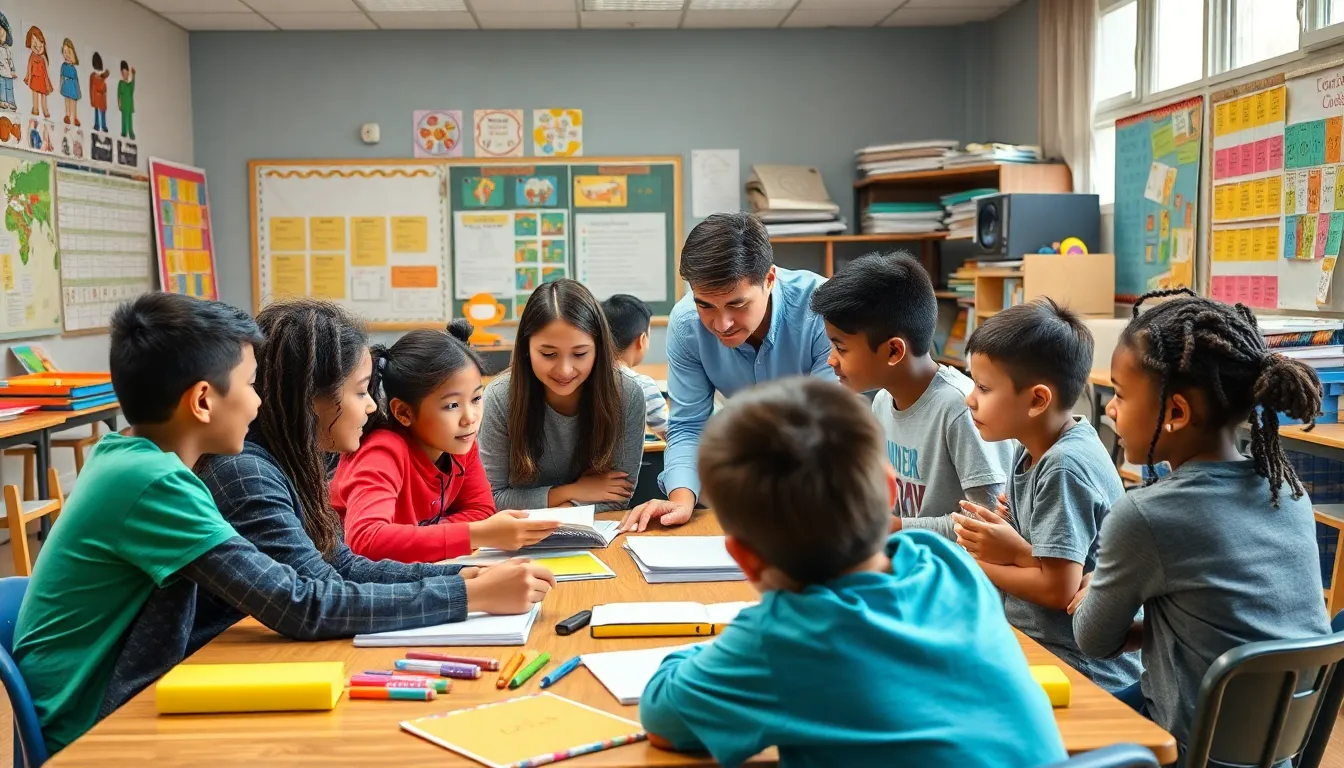Education isn’t just a box to check on life’s to-do list—it’s the foundation upon which successful careers and meaningful lives are built. At NITKA Education, students discover more than textbooks and homework; they uncover the pathways to their futures in an environment designed for growth and discovery.
The importance of quality school education can’t be overstated in today’s competitive world. While many focus solely on grades, NITKA’s approach emphasizes developing well-rounded individuals with critical thinking skills, emotional intelligence, and the confidence to tackle real-world challenges. This holistic development is what truly prepares students not just for exams, but for life itself.
Table of Contents
ToggleThe Fundamental Role of School Education in Society
School education forms the backbone of modern society, creating pathways for individual growth and collective advancement. Educational institutions like NITKA Education establish essential foundations that shape not only academic knowledge but also social structures and economic systems. These formative years in school develop critical cognitive abilities, social skills, and ethical frameworks that serve students throughout their lives.
Schools function as microcosms of society where children learn to navigate complex social dynamics. Students at NITKA Education experience diverse perspectives, collaborative problem-solving, and conflict resolution—crucial competencies for future community participation. This social learning happens alongside academic instruction, creating well-adjusted individuals capable of positive societal contributions.
Quality school education directly correlates with economic prosperity at both individual and national levels. Countries with robust educational systems consistently demonstrate higher productivity, innovation capacity, and economic stability. NITKA Education recognizes this connection, designing curricula that balance theoretical knowledge with practical applications relevant to evolving market demands.
Educational institutions also serve as cultural transmission vehicles, preserving heritage while encouraging progressive thinking. Through thoughtfully designed humanities programs, NITKA Education helps students understand their cultural roots while developing appreciation for global diversity. This cultural awareness fosters social cohesion and prepares students for increasingly interconnected world environments.
Schools provide structured environments for identifying learning differences, developmental needs, and exceptional talents. NITKA Education’s personalized approach ensures early intervention for struggling students while simultaneously nurturing gifted learners. This individualized attention maximizes each student’s potential regardless of their starting point or learning style.
How School Education Shapes Critical Thinking Skills
School education serves as the cornerstone for developing essential critical thinking abilities that last a lifetime. At NITKA Education, the curriculum is specifically designed to nurture these cognitive skills through structured learning experiences and thoughtful pedagogy.
Building Problem-Solving Abilities
Problem-solving skills emerge through consistent exposure to challenging scenarios in classroom environments. Students at NITKA Education engage with real-world problems that require creative solutions, helping them develop systematic approaches to obstacles. Teachers guide learners through a process of identifying issues, exploring multiple solutions, evaluating options, and implementing effective strategies. This methodical training transforms abstract concepts into practical applications across subjects like mathematics, science, and literature. The collaborative learning model encourages students to work in teams, exposing them to diverse perspectives and problem-solving approaches. These experiences prepare students to tackle complex challenges independently, a skill that transfers seamlessly from academic settings to professional environments.
Developing Analytical Reasoning
Analytical reasoning flourishes in educational environments that emphasize critical examination of information. NITKA Education incorporates exercises that require students to evaluate evidence, recognize patterns, and draw logical conclusions from various data sources. Class discussions center around analyzing texts, experimental results, and historical events from multiple perspectives. Students learn to distinguish between facts and opinions, identify logical fallacies, and construct sound arguments supported by credible evidence. The curriculum includes debates, case studies, and research projects that sharpen analytical capabilities through practical application. Teachers employ Socratic questioning techniques that prompt learners to dig deeper into subject matter rather than accepting information at face value. These analytical skills empower students to make informed decisions based on careful evaluation of available information, positioning them for success in higher education and diverse career paths.
Social Development Through School Education
School education serves as a crucial arena for social development, offering students diverse opportunities to interact and grow alongside peers from various backgrounds. At NITKA Education, social skills are considered equally important as academic achievements, recognizing that success in life depends significantly on one’s ability to navigate social landscapes effectively.
Learning to Collaborate and Communicate
NITKA Education creates structured collaborative environments where students learn to work effectively in teams through group projects, peer-to-peer learning, and extracurricular activities. Students develop essential communication skills by expressing ideas clearly, listening actively to others’ perspectives, and negotiating differences constructively. These collaborative experiences mirror real-world work environments, preparing students for future professional settings where teamwork drives success. Teachers facilitate these interactions by establishing clear roles, encouraging equal participation, and providing constructive feedback. The ability to collaborate across diverse groups builds cultural competence, adaptability, and mutual respect—qualities increasingly valued in our interconnected global society.
Developing Emotional Intelligence
Emotional intelligence flourishes in NITKA Education’s supportive school environment where students identify, understand, and manage their emotions while recognizing feelings in others. Teachers incorporate specific activities designed to enhance self-awareness, such as reflective journaling, mindfulness practices, and emotion-recognition exercises. Students practice empathy through perspective-taking activities, community service, and conflict resolution scenarios. NITKA’s curriculum includes lessons on stress management, impulse control, and positive relationship building—essential components of emotional resilience. These emotional intelligence skills correlate strongly with academic achievement, with emotionally intelligent students demonstrating greater focus, persistence, and adaptability when facing challenges. The social bonds formed through these emotional development practices create a positive school culture where students feel safe, valued, and motivated to learn.
The NITKAEDU Approach to Quality Education
NITKAEDU distinguishes itself through a comprehensive educational philosophy that prioritizes both academic excellence and personal growth. The institution’s commitment to quality education manifests in innovative teaching methodologies and a proven track record of student success across diverse fields.
NITKAEDU’s Innovative Teaching Methods
NITKAEDU employs cutting-edge pedagogical approaches that transcend traditional classroom instruction. Teachers utilize technology-integrated learning environments featuring interactive smartboards, virtual reality applications, and digital collaboration tools to enhance student engagement. Project-based learning forms the cornerstone of NITKAEDU’s curriculum, connecting theoretical concepts to real-world applications through hands-on activities that develop critical thinking skills.
Differentiated instruction addresses varied learning styles, with educators customizing content delivery through visual aids, auditory explanations, and kinesthetic activities. Small class sizes enable personalized attention and targeted feedback, creating optimal conditions for academic growth. The flipped classroom model encourages students to review lecture content independently before class, reserving valuable classroom time for interactive discussions, problem-solving sessions, and collaborative activities that deepen understanding and application.
Success Stories from NITKAEDU Graduates
NITKAEDU graduates consistently demonstrate exceptional achievement across professional sectors. Ravi Mehta, a 2015 alumnus, founded a sustainable technology startup valued at $20 million, crediting NITKAEDU’s entrepreneurship program for developing his business acumen. Dr. Priya Sharma, who graduated in 2010, now leads groundbreaking medical research at a prestigious university, having built her scientific foundation through NITKAEDU’s advanced laboratory programs.
Corporate leaders like Amit Patel, currently a senior executive at a Fortune 500 company, developed leadership skills through NITKAEDU’s debate team and student government initiatives. The creative industry features numerous NITKAEDU graduates, including award-winning filmmaker Sanya Kapoor, whose documentary work gained international recognition. Academic achievers from NITKAEDU routinely secure admissions to top-tier universities worldwide, with 87% of graduates receiving scholarship offers based on their exceptional academic preparation and extracurricular accomplishments.
Economic Benefits of School Education
School education forms the backbone of economic prosperity for individuals and societies alike. Quality education, like that provided by NITKA Education, creates pathways to financial stability and contributes significantly to broader economic development.
Career Opportunities and Increased Earning Potential
Education opens doors to diverse career paths that remain closed to those without formal schooling. Graduates from institutions like NITKA Education access higher-paying jobs across numerous sectors, with statistics showing that individuals with a high school diploma earn approximately 30% more than those without. This earning gap widens further with each educational milestone achieved. College graduates typically earn 80% more than high school dropouts over their lifetime, translating to millions in additional income. NITKA Education enhances these advantages through career counseling programs, industry partnerships, and internship opportunities that connect students with real-world professional networks before graduation. These connections often lead to job offers, apprenticeships, and mentorships that accelerate career progression and financial growth.
Contribution to National Development
Educational systems serve as engines for national economic growth and innovation capacity. Countries with higher literacy rates and educational attainment consistently demonstrate stronger GDP growth, with research indicating that each additional year of average schooling can increase a nation’s economic output by 8-13%. NITKA Education contributes to this national development by preparing students who become skilled workers, entrepreneurs, and innovators driving economic advancement. The taxation from higher-earning graduates funds essential public services and infrastructure projects. Educational institutions also create employment ecosystems around them, generating jobs for teachers, administrators, and support staff. Additionally, the research capabilities developed through quality education lead to technological breakthroughs and patents that enhance national competitiveness in global markets. NITKA Education’s focus on STEM disciplines particularly strengthens a nation’s innovation pipeline.
School Education as a Foundation for Lifelong Learning
School education at NITKA Education establishes the essential groundwork for continuous learning throughout life. Students develop not just academic knowledge but also the mindset to embrace ongoing education long after graduation. This foundation includes critical learning strategies, research methodologies, and information evaluation techniques that serve individuals across their entire lifespan.
NITKA Education’s curriculum specifically nurtures curiosity and intellectual exploration from an early age. Elementary students engage in inquiry-based projects that spark natural wonder, while middle schoolers participate in interdisciplinary studies connecting multiple subjects. High school students at NITKA conduct independent research projects that prepare them for university-level academic work.
Learning habits formed during school years significantly impact future educational pursuits. NITKA Education emphasizes self-directed learning skills including time management, goal setting, and effective study techniques. These competencies enable students to pursue knowledge independently, whether in formal educational settings or through self-study opportunities.
Digital literacy forms another cornerstone of NITKA’s lifelong learning approach. Students learn to navigate online resources, evaluate information critically, and utilize digital tools for continued education. Graduates leave with technological proficiencies that allow them to access global knowledge repositories and online learning platforms.
NITKA Education fosters meta-learning abilities—teaching students how to learn effectively. Reflection exercises help students understand their learning preferences, strengths, and areas for improvement. Self-assessment techniques and feedback integration methods become intrinsic skills that support educational endeavors throughout adulthood.
Conclusion
The significance of NITKA Education’s approach to schooling extends far beyond classroom walls. Their holistic framework equips students with critical thinking abilities analytical reasoning and emotional intelligence necessary for navigating today’s complex world.
By fostering collaboration communication and self-awareness NITKA Education creates graduates who excel academically while developing essential social capabilities. Their innovative teaching methodologies personalized attention and industry connections prepare students for remarkable achievements across diverse fields.
NITKA Education doesn’t just produce graduates with diplomas they develop lifelong learners with the curiosity resilience and adaptability to thrive in an ever-changing global landscape. This comprehensive educational foundation ultimately contributes to both individual success and broader societal advancement making quality school education truly invaluable.



